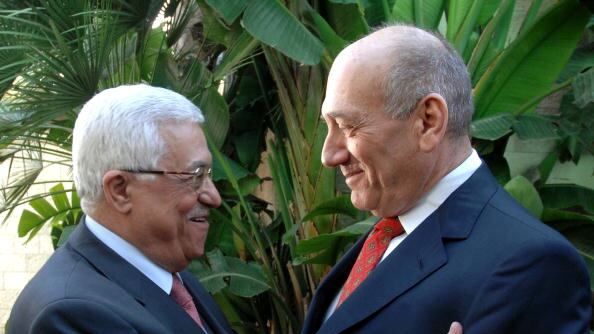Yesterday my editor Ali Gharib took the Washington Post to task for its ill-conceived weekend editorial concerning John Kerry’s recent push to restart Israeli-Palestinian negotiations. Let me start by saying that I agree with everything Ali wrote—except that he skipped something.
There’s a little moment, a single line, not even an entire sentence, buried deep in the editorial which serves as a kind of emblem of all that is wrong with so much of the discourse surrounding the conflict, including the contribution made by the very piece of writing in question.

“In 2008 Mr. Abbas rejected an offer from Mr. Netanyahu’s predecessor [Ehud Olmert],” the Post’s board writes, and then carries on its merry way to dismiss Kerry’s diplomatic efforts out-of-hand. The only problem being: It’s not true.
As Bernard Avishai reported in the New York Times in February 2011:
“We were very close,” Olmert told me, “more than ever in the past, to complete an agreement on principles that would have led to the end of the conflict between us and the Palestinians.” Abbas said the talks produced more “creative ideas” than any in the past. He took pains to assure me that he had been most flexible on Israel’s security demands. Olmert, in retrospect, agrees, saying that Abbas “had never said no.”
Was a deal struck during Olmert’s premiership? No, it was not. In that sense, then, I suppose it could be argued that Abbas “rejected” an offer from Olmert—but surely only in the same sense that Olmert “rejected” an offer from Abbas.
Thus, the Post did the very thing that a long list of Americans and Israelis have always done: Create an imaginary Palestinian, and then talk about that fictitious creature as if it were composed of flesh and blood rather than straw and propaganda.
Did Abbas reject Olmert’s offer? No. Is Abbas congenitally not-a-partner for peace? Nope. Did Yasser Arafat walk away from a “generous offer” at Camp David? No. Are the Palestinians likely to “back down” from a shared Jerusalem if Israelis don’t “blink”? Not likely. Is Palestinian culture to blame for the moribund state of the Palestinian economy? No (no, really: no). Are the Palestinians “an invented people”? No more than any other people. Are they, or were they ever, the equivalent of “cockroaches in a bottle”? Uhhh—no.
Some of the fictions hawked over nearly five decades of occupation skate near the truth—we can’t let Arafat entirely off the hook for Camp David any more than we can blame him exclusively—while others peddle in dehumanizing xenophobia, but all serve a narrative that few in positions of power care to question: That of the Israeli hero, standing against the odds and the barbarous hordes in the name of Democracy and Chicken Soup.
If, on the other hand, Olmert and Abbas were “very close” to an agreement; if Abbas has (in fact) been advocating for a two-state solution since 1977; if Ehud Barak and Bill Clinton share the blame for the failure of Camp David; if the Palestinians really mean it when they say that Jerusalem is their one and only capital; if Israel is the main force behind the shattered Palestinian economy; if, in fact, Israel shares the blame for all of its current troubles, from the waging of wars to the absence of peace, and Palestinians are as human as anyone else—then we may need to take them into consideration. We may need to give up our maximalist dreams (whether they be of a Greater Israel, or, in the case of America’s neocons, American global hegemony), and we may need to feel our way, however haltingly, toward mutually respectful accommodation.
But as Ali pointed out, mutually respectful accommodation is not now nor has it ever been on the Washington Post’s menu of options, so its editorial board needs to keep spinning a tale that doesn’t merely scoff at Kerry’s efforts to end decades of bloodshed (as in: actual people, actually dead), but (because it’s the Post) serves to effectively undermine those efforts.
It’s bad enough to casually print factual inaccuracies, but those who advocate for a continued state of managed-conflict in Israel/Palestine are arguing that millions of people should continue to pay the price of ideology in blood, bone, and grief. The folks at the Washington Post may not have skin in this game, but I do, and that’s a truth I can’t be quiet about.






